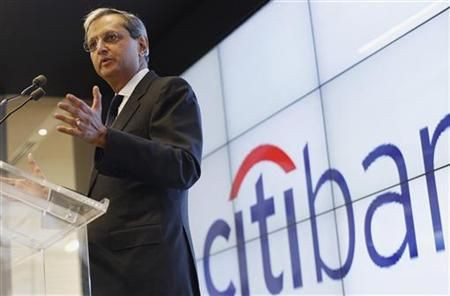Despite Mediocre Results, Vikram Pandit Gets His Mojo Back
ANALYSIS

The less-than-stellar results in front of him did not stop Vikram Pandit, the chief executive of New York-based Citigroup Inc., (NYSE:C) from displaying a surprisingly confident outlook, telling analysts during a conference call Monday that certain key business areas were more positive than a few months ago, and even better than market perception.
The exuberant cheerleading, which seemed to surprise several analysts on the call, came as Citi reported earnings for the second quarter of 2012 that were 12 percent lower than during the same period a year ago. Those earnings were still more than what analysts surveyed by Bloomberg had expected, but the gap between expectations and delivered numbers did not reflect overall business growth and came mostly as a result of lower realized losses on loans that allowed the bank to decrease its provision for credit losses. Revenues at the financial institution were down by 10 percent from year-ago figures.
In spite of those lower inflows, Pandit sounded an upbeat note Monday, telling analysts that the bank was riding high on expected growth in emerging markets, was not expecting to be lumped together with other banks currently being looked at by regulators for trading malfeasance, and could continue to perform even in an extended low-interest rate environment.
In short, we're on top of the things we can control, Pandit said.
Pandit's comments Monday followed a rare interview with London's Sunday Telegraph, in which he seemingly took indirect swipes at regulators in both the United States and Britain, disregarding Fed warnings on capital inadequacy to suggest the firm would be looking to raise its dividend in 2013, while noting there shouldn't be any need for some of the more stringent regulations being applied to banks in the UK.
The tone of those two public appearances is somewhat at odds with the image that Pandit has cultivated in the past as a paragon of responsible banking and bank chief executive devoid of swagger, as New York Times columnist and former finance reporter Joe Nocera described him in mid-June. Among other things, Pandit has been considerably more humble publicly about the precarious position of the banking sector after 2008 than some of his peers, coming out in favor of some increased regulation like the one presented by the Consumer Financial Protection Bureau and even stretching out a hand to the Occupy Wall Street movement saying their sentiments are completely understandable.
But that mild-mannered approach has not necessarily worked out as planned. Citi's stock, for one, has substantially lagged large bank peers Bank of America Corp. (NYSE:BAC) and JPMorgan Chase and Co. (NYSE:JPM). The lack of swagger Nocera praised has been interpreted as weakness by some shareholders, who embarrassed Pandit earlier this year by rejecting his proposed $15 million compensation deal. The openness to regulators has not been reciprocated, with the Federal Reserve failing the bank during its yearly round of stress tests in mid-March. As for the Occupy Wall Street protesters? They doubled down on Pandit after his comments, requesting a meeting with him and posting his personal mobile phone number online as a PR stunt when he took months to reply.
At the same time, the man who is the antithesis to Pandit, Jamie Dimon of JPMorgan Chase, has been floating unscathed through scandal after scandal at his banking institution with a pugilistic attitude to naysayers and oft-repeated assertions that his bank has a fortress balance sheet. Dimon, who apologized through his teeth after the bank had to admit multibillion-dollar trading losses in April, has not seen the kind of shareholder push-back Pandit has. When he was called to testify before the U.S. Senate In June for allowing the people under him to take the kind of risk that resulted in the trading losses, potentially putting taxpayers on the hook for another rescue of a financial institution, he was unapologetic. JPMorgan's stock rose. When he finally reported the sum of the trading losses for the second quarter would amount to $5.8 billion Friday, and further noted irregularities in other areas of trading would lead to to a restatement of first-quarter results, he was unapologetic. JPMorgan's stock rose.
Two instances do not make a pattern, so it is too early to tell. But if Pandit's guns-a-blazin' confidence continues, it could prove part of a wider plan to reposition his brand toward what seems to be working.
In the conference call Monday, Pandit responded testily to a question from Mike Mayo, a bank analyst with Hong Kong-based CLSA who has criticized Pandit in the past and was questioning the CEO's exuberance over prospects for retail banking in Asia, given the economic slowdown currently seen there.
Pandit said policymakers in that continent have a plan and they're acting on it.
So too might Vikram Pandit.
© Copyright IBTimes 2025. All rights reserved.





















